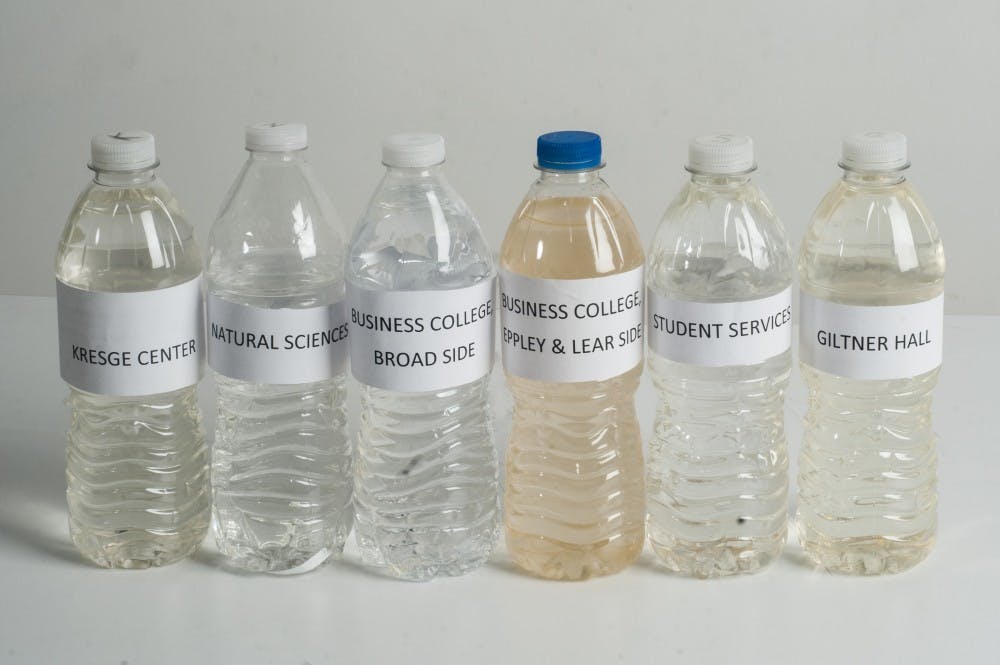Following a story published in December regarding questionable water quality at the Eli Broad College of Business, other students came forward with complaints about the water in MSU buildings across campus.
Fisheries and wildlife junior Luke Maki said the Natural Science and Natural Resources buildings had poor water quality.
“I prefer to bring (water) from home because the water on campus here that I fill my bottle with very rarely (seems) to taste as good, it seems to have a slight coloration to it,” Maki said.
Neuroscience junior Franco Bull said the Psychology Building, other buildings in North Neighborhood and Student Services suffer from the same water quality problem.
“(The water at Student Services) has a very strange taste to it, kind of a sulphur, phosphorus type of thing to it," Bull said.
Social relations and policy junior Adonne Washington said Case Hall shared the same water problems.
“The water quality here was not good whatsoever, it was actually harsh," Washington said.
Washington said she experienced breakouts, dry skin and hair breakage from the showers at Case Hall, where she lived for two years.
"We didn’t drink the water, even (in) the water fountains where you can fill up your water bottle with the automatic dispenser, the water sometimes came out yellow. ... It kind of tasted like metal,” Washington said.
Washington said the water in the rooms didn't taste as bad as the water fountains, and believed that defeated the purpose of the fountains.
She didn't know if the problem was room specific, but said her suite mates agreed with her on the water quality, Washington said.
John Reilly, skilled trades supervisor at MSU Infrastructure Planning and Facilities, attempted to clear up what he perceived as students' misconceptions.
“MSU water is delivered from wells, tested and deemed safe for consumption,” Reilly said in an email. "MSU has over (70) miles of transmission pipe conveying our drinking water to the buildings. On occasion, a water main failure or modification to the transmission pipe will cause the iron deposits from the water to release from the inside pipe walls causing what we call, ‘red water,' actually yellow in color.”
The most recent red water alert was sent out by MSU Infrastructure Planning and Facilities on Dec. 21, with the red water event taking place on Dec. 29.
The email, written by Infrastructure Planning and Facilities design administrator John LeFevre, said the recent testing is related to adding additional offices to the Cyclotron building.
“During this brief test, some discoloration of the water supply may occur near the Shaw Lane corridor, MSU College of Law and the Chemistry Building,” LeFevre wrote in the email. “While the discoloration is harmless in terms of sanitation and safety, it is possible that it may discolor clothing if used for laundry.”
Reilly said that the age of infrastructure plays a large role in water quality, citing that the oldest buildings on campus receive the highest volume of complaints. and he said this can happen in any building on campus and red water alerts are sent to buildings impacted.
Support student media!
Please consider donating to The State News and help fund the future of journalism.
He added crews are quick to respond, flushing the fouled water at hydrants and within affected buildings.
Additionally, Reilly stated the Business College Complex has two separate water feeds, the water that was the subject of the previous article coming from the original pipe to the building. The original pipe delivers water to the side of the building containing the Eppley Center and Career Services Center, while the North Business Complex has a newer pipeline.
“Upon hearing of the condition of the water in the Business College Complex, we immediately drew samples to find exceptional water in the newly piped Broad side ... We did find discolored yet safe water at (the Eppley and Lear side),” Reilly said.
The plumbing crew installed filters at water coolers to catch the iron and are currently piping an arrangement to allow the flushing of any red water still present, Reilly said.
“When we field concerns from customers about the water in buildings we promptly investigate the condition of pipe, incorporate filtration, perform flushes and sometimes re-pipe the system, replacing old galvanized steel pipe with copper pipe,” Reilly said.
Reilly said MSU Power and Water publishes yearly water quality reports available to the public. The 2014 report said MSU water meets or surpasses all federal and state drinking water standards.
Discussion
Share and discuss “Concerns of water quality on campus addressed by officials” on social media.







